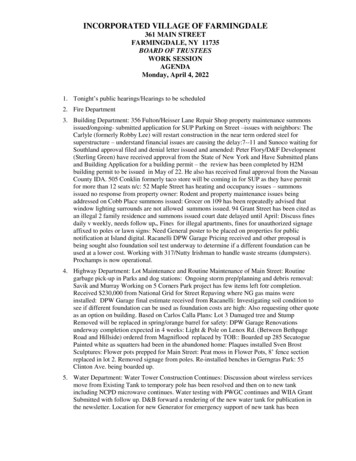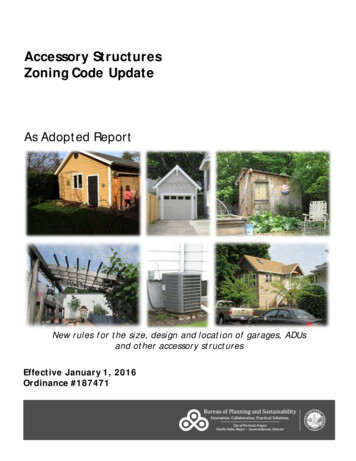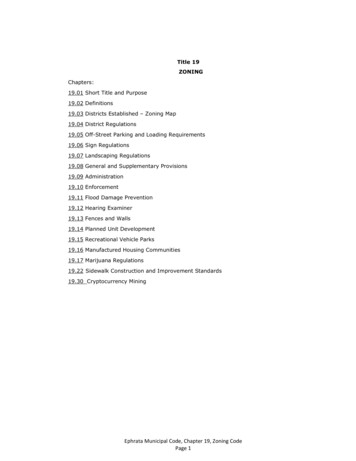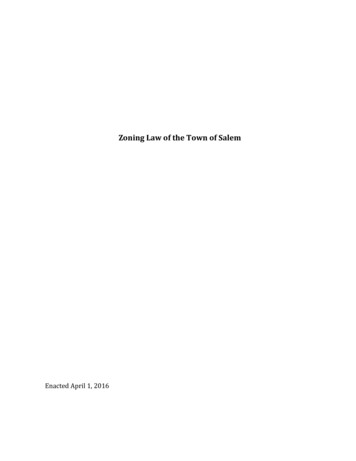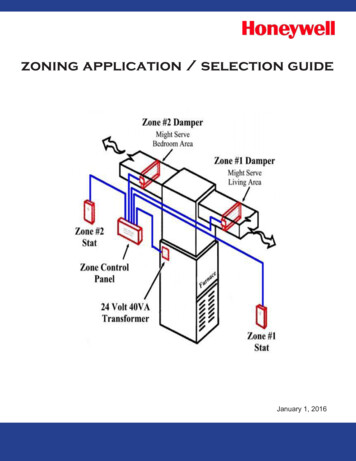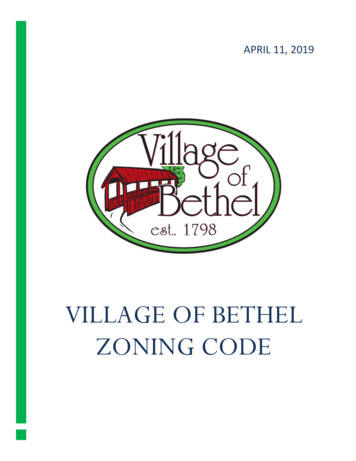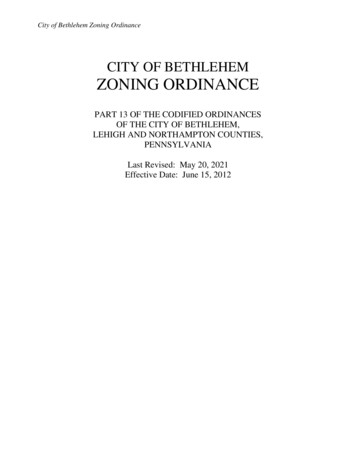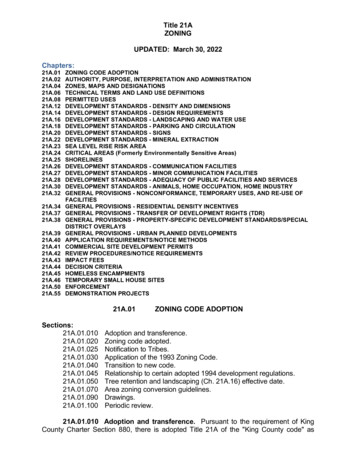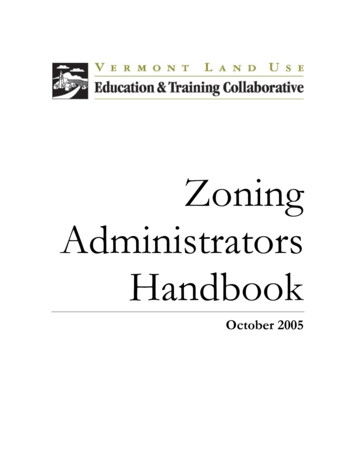
Transcription
ZoningAdministratorsHandbookOctober 2005
Table of ContentsPreface to Third Edition. iiiIntroduction. v1. The Zoning Administrator . 1Statutory Authority . 1Appointment and Removal. 1Acting Zoning Administrator. 1Salary . 2Other Offices . 2Qualifications. 22. Duties of the Zoning Administrator . 5Issuing Permits. 5Assistance to Applicants. 5Administrative Functions . 5Administrative Review. 7Enforcement . 7Appeals. 73. Limits of Authority . 9Literal Interpretation. 9Administrative Guidelines . 94. Permits and Approvals . 11Statutory Requirements . 11Applicant Assistance . 11Application Submitted . 11Zoning Administrator Action. 12Appeal of Zoning Administrator Action . 13Board Action . 13After Board Review . 14Posting Permits . 14Permits Pending Appeal. 14Appeal to Vermont Environmental Court. 14Notifying Listers . 15Zoning Administrators Handbook · October 2005 · www.vpic.infoVERMONT LAND USE EDUCATION AND TRAINING COLLABORATIVEi
Recording Permits. 16Pending Zoning Changes . 16Interim Zoning. 16Certificates of Occupancy . 175. Enforcement . 19Discovering the Violation. 19Investigating a Violation . 20Search and Seizure Law . 21Informal Warnings . 22Notice of Violation . 23Judicial Bureau Alternative. 24Enforcement Authorizations . 25Court Action . 25Settlements. 26Statute of Limitations . 26Penalties. 27Selective Enforcement . 286. Special Issues . 29Existing Small Lots. 29Lots with Multiple Principal Structures . 31Required Frontage . 32Home Occupations . 33Mobile Homes . 33Mobile Home Parks. 34Accessory Dwellings . 35Antennae, Wind Turbines and Rooftop Solar Collectors. 36Energy-related Structures . 36Satellite Dishes. 36Agricultural Structures and Uses . 38Appendices. 1The Players - Roles in Local Planning and Regulation . 1Sample Notice of Violation. 4Referrals for Permit Applications, Reviews, Approval and Appeals . 5Other Resources for Zoning Administrators . 6Zoning Administrators Handbook · October 2005 · www.vpic.infoVERMONT LAND USE EDUCATION AND TRAINING COLLABORATIVEii
Preface to Third EditionZoning is the most common land use tool in Vermont. Based on a town plan,zoning encourages the appropriate development of land in ways that the voters and localofficials have approved. It is done purely to protect the public health, safety and generalwelfare of the residents. In order to preserve the rights of the individual property owner,competent administration and even-handed enforcement of adopted zoning bylaws isessential. These objectives can be realized only if administrative officials have a clearunderstanding of the relevant legal requirements and limitations of the zoning process and awillingness to adapt the regulatory framework to fit local needs.Rarely is there a simple answer to a land use question, nor can a simple discussionanticipate and adequately respond to the full range of problems to be encountered by thezoning administrator. Because of the complexity and endless variation of site conditions andownership patterns associated with land development, each permit application must beconsidered and judged solely on the basis of the specific factual circumstances associatedwith the proposed use or development. Nevertheless, an attempt has been made in thishandbook to identify and discuss a number of common administrative problems andpotential solutions as they relate to basic zoning principles and procedures. Once theseprinciples and procedures are understood in context with current law, the zoningadministrator should have a sound basis for properly evaluating a zoning application,complaint, or violation and taking the appropriate action.In addition to its use as a procedural guide for the zoning administrator, the contentof this handbook is also important to the planning commission, zoning board ofadjustment/development review board and the municipal legislative body, who areresponsible for adopting and amending the bylaws, hearing appeals of an administrator’sdecisions and appointing and/or removing the zoning administrator.This edition of the Zoning Administrators Handbook was updated with theassistance of Burnt Rock, Inc., Associates in Community Planning of Waitsfield Vermont.Review, editing and formatting was provided by the Vermont Dept. of Housing andCommunity Affairs. Special thanks are due to Deb Markowitz, the Vermont League of Citesand Towns, Paul Gillies, and Northwest Regional Planning Commission for their time inreviewing this document.October, 2005Zoning Administrators Handbook · October 2005 · www.vpic.infoVERMONT LAND USE EDUCATION AND TRAINING COLLABORATIVEiii
Zoning Administrators Handbook · October 2005 · www.vpic.infoVERMONT LAND USE EDUCATION AND TRAINING COLLABORATIVEiv
IntroductionZoning is a legal process that restricts the use of private property. Becausethe stakes are high for both the landowner and community, these restrictions mustconform to state law as written by the legislature and interpreted by the courts.Once adopted, zoning bylaws and subdivision regulations are the law of the town.Local officials must administer them in a uniform, consistent manner for theiractions to be respected both by the townspeople and in the courts.The aim of this handbook is to provide the administrative officer (commonlyreferred to as the zoning administrator) with an understanding of some basicprinciples of zoning administration and enforcement and their application to a widerange of problems likely to be encountered. It is also a plea for consistency inconforming to established criteria and a caution against uninformed, arbitrary, andunfair actions that violate the law as well as people's rights.The zoning administrator is, in large measure, responsible for ensuring theintegrity and effectiveness of this process and for the public support it receives. Sincehe or she is the initial and often sole zoning contact with affected property owners,intelligent, firm, and impartial administration and enforcement conducted withsensitivity to public relations are essential.Willing compliance with ordinance requirements is a measure of thepromptness and tact with which an applicant or violator is handled and the trustengendered by the administrator's expertise. This expertise is fostered by acquiring aclear understanding of the purpose, theory, and practice of zoning and by developingan ability to communicate this knowledge clearly and precisely to an applicant,violator or other interested party.The content of this handbook is primarily technical. It is based on acollective knowledge of the planning and zoning process and daily experience inresponding to individual problems. Hopefully, it will provide the municipal zoningadministrator with a better understanding of the responsibilities and legal limits ofhis or her authority and assure that proper procedures are followed in handlingzoning applications and enforcing violations.This edition of the handbook was prepared to incorporate statutory changesto the Vermont Planning and Development Act, 24 V.S.A. Chapter 117 that wentinto effect in July, 2004 as a result of Act 115. Unless otherwise indicated, allstatutory references are to 24 V.S.A. Chapter 117.Zoning Administrators Handbook · October 2005 · www.vpic.infoVERMONT LAND USE EDUCATION AND TRAINING COLLABORATIVEv
Zoning Administrators Handbook · October 2005 · www.vpic.infoVERMONT LAND USE EDUCATION AND TRAINING COLLABORATIVEvi
1. The Zoning AdministratorStatutory AuthorityThe Administrative Officer, commonly referred to as the Zoning Administer (ZA), isresponsible for the administration and enforcement of zoning and other bylawsadopted under the Vermont Municipal and Regional Planning and Development Act(24 V.S.A. Chapter 117).1 Terms of appointment, duties and responsibilities of theZA are prescribed by statute [§4448].Appointment and RemovalA ZA must be appointed promptly after the adoption of a municipality’s first bylawor whenever the position becomes vacant. The planning commission has theresponsibility of nominating candidates for ZA to the legislative body (e.g.,selectboard, city council, village trustees). The legislative body has the authority toappoint a ZA to a three-year term [§4448(a)].The legislative body, after consultation with the planning commission, may removethe ZA from office for good cause [§4448(a)]. The legislative body must give the ZAnotice of the pending dismissal and the facts that form the basis of the decision todismiss.NoteThe ZA is subject to all municipal personnel policies unless specificallyexempted. The ZA has a right to remain employed for the three-year term;that cannot be altered without first providing due process. There is no rightto reappointment when a three-year term is completed, however, and thelegislative body may choose to appoint a new ZA without going through theprocess of dismissal.The legislative body must also provide the ZA with a hearing, if requested.2 At thehearing, the ZA must have an opportunity to bring witnesses and provide otherevidence to show that there is no good cause for dismissal.Acting Zoning AdministratorThe planning commission may also nominate one or more persons to serve as actingZA, for appointment by the legislative body. An acting ZA has the same duties andresponsibilities as the regular ZA and serves in the absence of the regular ZA. If anSpecific statutory citations have been included adjacent to related provisions and requirements. All citationsrefer to 24 V.S.A. Chapter 117 unless otherwise noted.1Case law has established that it is a constitutional due process requirement that a person who can only bedismissed for cause has a right to notice and an opportunity to be heard prior to dismissal.2Zoning Administrators Handbook · October 2005 · www.vpic.infoVERMONT LAND USE EDUCATION AND TRAINING COLLABORATIVE1
acting ZA is appointed, or if the municipality appoints an assistant ZA, clear policiesregarding the authority of the ZA in relation to the acting or assistant ZA must beestablished [§4448(b)].SalaryThe ZA’s salary is set either by a vote at townmeeting or by the legislative body. (24 V.S.A.Chapter 33 §932). If the legislative body setsthe salary, it may alter the ZA’s salary andbenefits, so long as such alteration ispermitted by the municipal personnel policyor collective bargaining agreement.Some smaller municipalities allow their ZA toretain a percentage of the permit fees insteadof receiving a salary. This is acceptable,although those fees must be treated as wagesfor state and federal payroll tax withholdingpurposes. All fees must be paid to themunicipal treasurer who then issues a checkto the ZA. Using application fees as the solesource of a ZA’s wages, however, may notprovide a strong incentive for enforcement orother duties not directly related to theissuance of permits.Role of the Acting ZoningAdministratorIf your community has notalready done so, it should considerappointing an acting ZA. An actingZA has the same duties andresponsibilities as the ZA andserves in the ZA’s absence. Thus,the acting ZA is available to step inand carry out the ZA’s duties whileon vacation or on sick leave.Some municipalities allowthe appointed ZA to call upon theacting ZA when the ZA has aconflict of interest regarding aparticular application. To avoidconfusion over the circumstancesin which the acting ZA isauthorized to carry out the duties ofthe ZA, municipalities are requiredto establish a clear policy outliningtheir respective authority.Other OfficesThe ZA can hold other offices in the municipality, with the exception ofmembership on the Board of Adjustment or Development Review Board [§4448(a)].The ZA may, for example, serve as a member of the planning commission orlegislative body, and it is common for the ZA to also function as the local health orsewage officer.QualificationsThere are no specific educational or background requirements for a ZA, althoughthe job requires a thorough knowledge of:1.2.3.4.5.6.7.The community, including general geography and settlement patterns;The objectives of the municipal plan;The purpose, theory and practice of zoning;The Vermont Planning and Development Act, 24 V.S.A. Chapter 117;The municipal bylaw(s) to be administered;Other relevant municipal ordinances and polices; andBasic understanding of state statutes and regulations related to land use andland development.Zoning Administrators Handbook · October 2005 · www.vpic.infoVERMONT LAND USE EDUCATION AND TRAINING COLLABORATIVE2
Equally important are the personal qualities of courtesy, tactfulness, objectivity,common sense and fairness. The ZA will need the ability to communicate clearly,both verbally and in writing, with a wide variety of people. A person treated fairlyand impartially by a knowledgeable ZA stands a good chance of feeling well servedby the process.The ZA must understand the role and authority of the legislative body, the Board ofAdjustment or Development Review Board and the planning commission. The ZA isin a good position to help ensure that there is a harmonious working relationshipbetween these bodies. The ZA should also be prepared to provide staff reports andtestimony before the board during appeals.Zoning Administrators Handbook · October 2005 · www.vpic.infoVERMONT LAND USE EDUCATION AND TRAINING COLLABORATIVE3
Zoning Administrators Handbook · October 2005 · www.vpic.infoVERMONT LAND USE EDUCATION AND TRAINING COLLABORATIVE4
2. Duties of the Zoning AdministratorIssuing PermitsMunicipal land use permitThe ZA issues zoning permits for all landdevelopment not specifically exempted under themunicipal zoning bylaw [§4449]. In someinstances, approval of one or more “appropriatemunicipal panels” (i.e., the planning commission,board of adjustment or development reviewboard), or the legislative body, is required beforethe ZA may issue a zoning permit.The ZA must administer the bylaws literally andonly has authority to permit land developmentthat strictly conforms to the municipal bylaws[§4448(a)], (see Chapter 4).is a statutory term that includesa zoning, subdivision, site planor building permit or approval,any of which relate to landdevelopment as defined instatute [§4303(11)], which hasreceived final approval from theapplicable board, commission orofficer of the municipality. Italso includes wastewatersystem permits, certificates ofoccupancy and compliance, andany amendments to a priorpermit or approval.Assistance to ApplicantsAn important function of the ZA is to provide property owners and other membersof the public with the necessary forms to obtain any municipal permit orauthorization required under local bylaws or ordinances regulating land development.In this way the ZA can help coordinate a unified effort on behalf of the municipalitywith regard to the administration of its land use and development regulations[§4448(c)]. To best serve the public, the ZA should be available during specifiedhours, and be knowledgeable of all local permits and approvals that are required ofapplicants.The ZA should also inform people applying for municipal permits and approvals tocontact the Vermont Agency of Natural Resources’ regional permit specialist inorder to assure timely action on any required state permits [§4448(c)]. To find theSpecialist assigned to your town please see: ur Specialist will provide you with brochures you can give to municipal permitapplicants which explain state permits and give contact information.NoteFailure of the ZA to notify an applicant of all state permit requirements doesnot excuse an applicant from their obligation to identify, apply for and obtainall relevant state permits.Administrative FunctionsIt is common for the ZA to perform a variety of administrative functions for themunicipality. These functions may vary depending upon the complexity of localbylaws and whether other paid staff is working with the zoning and planning boards.Zoning Administrators Handbook · October 2005 · www.vpic.infoVERMONT LAND USE EDUCATION AND TRAINING COLLABORATIVE5
The range of administrative functions and type of staff support provided by the ZAbeyond what is required in statute is up to each municipality.The ZA often acts as clerk of the planning commission and/or development reviewboard/board of adjustment. In that role, the ZA may be required to help set meetingagendas, schedule and warn public hearings, and ensure that the boards have theassistance and information required to perform their duties. These functions,however, are not required by statute. At a minimum, however, the ZA should informthe planning commission about errors or inconsistencies in the bylaw(s) andrecurring problems of interpretation, administration and enforcement. The planningcommission can then propose needed amendments to the bylaw.A Zoning Administrator ought not, however, confuse the clerk’s duties with those ofthe zoning board, development review board, or planning commission in makingdecisions. The ZA is a party or a witness to most permit reviews. The board orcommission should make its own decision in a deliberative session without the ZApresent, and to avoid an unhealthy mixing of roles, the ZA should not write theboard or commission’s decision.Certain administrative functions are required by statute to be performed by the ZA.These include:1. Assisting landowners and interested parties with required forms andproviding information about local permit requirements [§4448];2. Referring applications to the appropriate municipal panel having jurisdictionover a proposed land use or development (e.g., for site plan or conditionaluse approval), and to other municipal staff, departments or advisorycommissions as specified in the bylaws [§§4448, 4460, 4464];3. Referring applications within special flood hazard areas to the state’s nationalfloodplain insurance program coordinator within the Agency of NaturalResources’ River Management Section, and to the Agency’s stream alterationengineer and adjoining municipalities if a watercourse alteration or relocationis proposed (under locally adopted flood hazard area regulations) [§4424];4. Issuing zoning permits and certificates of occupancy or compliance [§4449];5. Providing a “notice of permit” with each permit issued, to be posted withinview of the public right-of-way most nearly adjacent to the subject propertyuntil the period in which an appeal may be filed has expired [§4449];6. Posting a copy of every zoning permit in at least one public place in themunicipality within three days after issuing the permit. Each permit mustremain posted for 15 days following the permit’s date of issuance [§4449];7. Delivering a copy of every zoning permit to the listers of the municipality,also within three days of issuing the permit [§4449]; and8. Recording permits or notice of permits, permit denials, certificates ofoccupancy and violations with the municipal clerk within 30 days of takingaction [§4449].Zoning Administrators Handbook · October 2005 · www.vpic.infoVERMONT LAND USE EDUCATION AND TRAINING COLLABORATIVE6
9. Answering public information requests – the ZA is the custodian of permitrecords and must assist individuals who are researching the permit history ofa property [§4448].10. Receiving notices of appeal of local decisions to the Vermont EnvironmentalCourt, if the municipality has designated the ZA as being responsible for this,in which case the ZA shall supply a list of interested persons to the appellantwithin five working days of receiving the notice [§4471].11. Enforcing all violations of the bylaw(s), including the issuance of notices ofviolation [§§4451, 4452].Administrative ReviewUnder certain circumstances, the ZA may be authorized under the bylaws to reviewand approve new development, and amendments to previously approveddevelopment, that would otherwise require review and approval of one or moreappropriate municipal panels. This is commonly referred to as “administrativereview.” If a community opts to extend this authority to the ZA, the bylaws mustclearly specify the thresholds and conditions under which an application may beclassified as being eligible for administrative review. Under no circumstances may aZA approve a development that results in a substantial impact under any of thestandards set forth in the bylaws, or approve an amendment that has the effect ofsubstantially altering the findings of fact of the most recent approval [§4464(c)].EnforcementThe ZA must act to stop or prevent violations of duly adopted bylaws. To do this,the ZA must institute, in the name of the municipality, an action, injunction or otherproceeding to prevent or abate violations [§4452]. The ZA has no discretion onwhether to enforce known violations and must enforce all such violations in themunicipality [see in re Fairchild, 159 Vt. 125 (1992)], (also see Chapter 5).AppealsActions of the ZA may be appealed to the zoning board of adjustment ordevelopment review board within 15 days of the date that the action was taken[§4465]. The ZA must participate in the appeal by explaining the action that is underappeal and by presenting evidence to support the action. In addition, the ZA mayquestion any witness or evidence presented during the hearing.Zoning Administrators Handbook · October 2005 · www.vpic.infoVERMONT LAND USE EDUCATION AND TRAINING COLLABORATIVE7
Due ProcessThe 14th amendment of the U.S. Constitution dictates that the governmentcannot take away a person's basic rights to 'life, liberty or property, without due processof law.' Due process guarantees that citizens have a right to a fair hearing before animpartial decision-maker. Federal and state courts have issued numerous rulingsabout what this means in particular cases [e.g., Town of Randolph v. Estate of White,166 Vt, 280 (1997)].The Zoning Administrator is an officer of the law and must interpret the law(bylaw) literally. The ZA’s discretion is limited and defined by state statutes as well asadopted municipal bylaws, ordinances and administrative policies. As a matter of dueprocess, all actions of the ZA (and of app
Zoning Administrators Handbook · October 2005 · www.vpic.info VERMONT LAND USE EDUCATION AND TRAINING COLLABORATIVE iii Preface to Third Edition Zoning is the most common land use tool in Vermont. Based on a town plan, zoning encourages the appropriate development of land in ways that the voters and local officials have approved.
